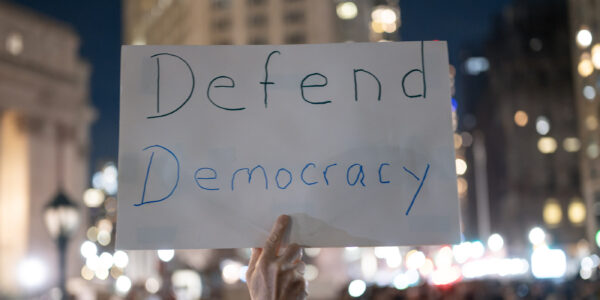In light of the revelation that Attorney General Alberto Gonzales misled Congress about his knowledge of the FBI's abuse of National Security Letters (NSL) to make the case for reauthorization of the Patriot Act, four NSL recipients spoke out. George Christian, Janet Nocek, Barbara Bailey and Peter Chase - employees or officers of Library Connection, a consortium of libraries in Connecticut - were plaintiffs in Doe v. Gonzales, the ACLU's challenge to the Department of Justice's use of NSLs.
NSL Recipient George Christian Outraged AG Misled Congress
I am not surprised, but I am outraged that Attorney General Gonzales misled Congress when he claimed that he was not aware of any instances of civil liberties abuse. I am the recipient of a National Security Letter issued under the authority of the USA PATRIOT Act. Along with three colleagues and the ACLU, I won the right in Federal District Court to discuss that fact. To our knowledge every other recipient (estimates vary, but currently hover around 150,000 between 2003 and 2005) of an NSL is perpetually gagged and must take the secret of their experience with them to their graves. I believe their free speech rights have been violated - every federal court that has looked at this issue has concluded that a perpetual gag amounts to an unconstitutional prior restraint.
I know my free speech rights were violated. My colleagues and I wanted to inform Congress that our organization, a consortium of 27 libraries, had received a National Security Letter. We wanted to do this back when Congress was debating the renewal of those provisions of the USA PATRIOT Act that were about to sunset. At this time the Justice Department was giving Congress the impression that the USA PATRIOT Act had not been and would not be used against libraries. At least four of the citizens who could refute such a claim were prevented from doing so. A few weeks after the USA PATRIOT Act was renewed, the Justice Department decided we no longer needed to be gagged.
What a remarkable coincidence.
A National Security Letter is in effect a demand for records issued by the FBI with no judicial approval, with no third party review for probable cause. Most letters request banking records or phone records or email records about people. So several multiples (10? 50? 100?) of 150,000 people have had their phone records or banking records or email activity turned over to the FBI in secret and with no showing of probable cause.
The crux of the problem is the government cannot be allowed to operate without oversight and without checks and balances. Under a blanket of secrecy - and the PATRIOT Act has many such blankets - human frailty and the need for expediency will always lead to abuse. Allowed to proceed unchecked, over time abuse becomes the rule rather than the exception.
Unless we insist on stringent and meaningful oversight, we are all in danger of losing all of our liberties in an expanding fog of national security claims. In addition to fighting our gag order, my colleagues and I resisted complying with the National Security Letter's request for patron information at one of our libraries. We did so on the grounds that there was no judicial review of the NSL - no evidence to us that an independent judiciary had found the request to be justified by probable cause.
Recently the Judiciary Committee asked the FBI for a tally of how many libraries have been served National Security Letters. Their answer? That the number of libraries served with National Security Letters is classified. A real number could lead to Congressional investigation and review. Over-classification and misleading statements from the Attorney General are the means this administration is using to get itself off the hook. We must stop the fog from spreading further. Congress should return oversight, return checks and balances, and save our imperiled civil liberties.
- George Christian, Executive Director, Library Connection
Janet Nocek: "No One Got to Hear the Real Story"
When I read the news about Attorney General Alberto Gonzales lying to Congress, I must say that I felt vindicated.
Back when the Patriot Act was being reauthorized in 2005, Gonzales claimed that not one single abuse of the National Security Letter (NSL) provision had been reported. Now it appears that he had reports in his possession about mismanagement or abuse of the NSL provision well before he testified.
It must have been poor memory, what else could explain why it did not occur to the Attorney General to look at the reports, or recall their content before giving testimony to Congress. He apparently saw no evil and heard no evil. As a result, the PATRIOT Act was reauthorized without significant change to the "nondisclosure" provision that allows the FBI to prevent anyone who ever receives an NSL from talking about the experience, to anyone, for his entire life.
At the time, I was one of four people who had challenged an NSL in the courts. Three colleagues in the library field and I were under a gag order even though a judge with a high level of security clearance had declared there was no security risk in our identifying ourselves publicly as recipients of an NSL. We were not allowed to testify to Congress about our experience and our concerns about the letters.
It is more than irksome that we were prevented from testifying before Congress about potential abuses of the Patriot Act and that Gonzales chose to ignore the reports of abuse and provided false testimony. No one got to hear the real story.
According to news reports, hundreds of thousands of these letters have been sent out. My colleagues and I are the only the recipients that we know of who can speak about their experience. These gagged men and women cannot relate the scope and nature of the information they gave to the FBI. It is laughable to assume that no abuse has been made of the NSL provision. The secrecy under which the provision is administered guarantees a lack of oversight and negates the possibility of effective change to the law.
I don't believe the FBI is to blame for their mismanagement of NSLs. Because the PATRIOT ACT does not address the lack of court and congressional oversight nor the apparent absence of related records requirements, abuse and mismanagement are practically a given.
- Janet Nocek, Library Director, Portland Library
NSL Recipient Peter Chase Calls NSLs the "Perfect Vehicle for Abuse"
I and my three fellow librarians are the only Americans we know of who can talk about receiving a National Security Letter - more than 150,000 others between 2003 and 2005 were put under life time gag orders. When I read the story about the abuse of National Security Letters in the Washington Post , I was not surprised.
In my case, the FBI tried to get library use records with an NSL, but without a court order, during the summer of 2005. They did this while at the same time telling Congress that they weren't using the Patriot Act against libraries. If I had exposed the truth that summer, I could have faced a jail term. After the Patriot Act was reauthorized in the spring of 2006, the FBI changed their mind and declared that our identity was no longer a threat to the national security and we could speak about receiving a NSL, but Congress had already acted by then. In our case, the FBI was not protecting national security by having us gagged, they were protecting themselves.
I believe there could be far worst abuses that only the recipients of the National Security Letters would reveal. But, of course, they are under threat of jail terms if they did. We were told that even the number of National Security Letters used against libraries was a secret. The gag order provision of National Security Letters makes them perfect vehicle for abuse.
- Peter Chase, Director, Plainview Public Library
NSL Recipient Barbara Bailey: "I Am a True Patriot"
In July, 2005 I was President of Library Connection, Inc. (LCI), a consortium of 27 libraries located in the greater Hartford, Conn., area that share an online library system. At the time, about one-half of our members received their telecommunications service through our consortium.
That July, my life changed forever. It was then that I was notified by LCI Executive Director, George Christian, that LCI was to receive a National Security Letter (NSL). Having never heard of an NSL, I quickly googled it and what I learned was personally and professionally enraging.
I learned that a NSL is written for the FBI, by the FBI. They don't need probable cause and there is no court approval, such as a court warrant, to keep NSLs from being abused. I also learned that a NSL comes complete with a gag that prohibits recipients from ever telling anyone that they received such a letter.
Now, I was really angry.
I am a librarian and adhere to the Code of Ethics of the American Library Association and the Library Bill of Rights. One of the code's articles states that librarians "protect each library user's right to privacy and confidentiality with respect to information sought or received and resources consulted, borrowed, acquired or transmitted." Our patrons expect us to maintain this privacy and now LCI was being asked to betray a user in the dark of night with no probable cause and no warrant.
Our organization ended up voting to sue the Attorney General of the United States to be relieved from the gag order so that we could share our story with Congress while the Patriot Act was up for renewal. At that time, officials and press accounts were saying that the Patriot Act was not being used against libraries. We knew otherwise!
We won our battle and our gag has been removed - but we are the only recipients of NSLs who can speak publicly about our experience. I am proud to be an American, and feel that I am a true patriot for standing up for freedoms that this country stands for. Congress should revisit the flawed Patriot Act and make sure that other American patriots get that same chance.
- Barbara Bailey, Director, Welles-Turner Memorial Library


